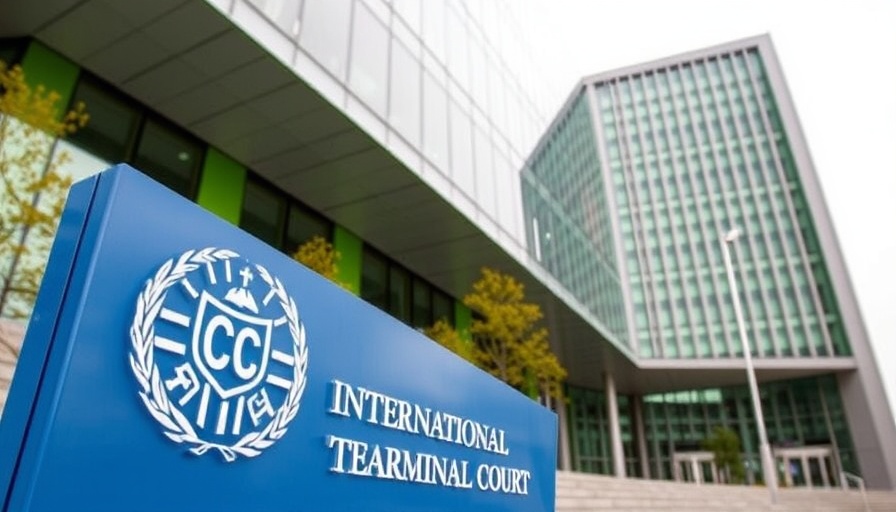
ICC Takes Action Against Taliban Leadership: A Historic Move
On July 8, 2025, the International Criminal Court (ICC) made a profound statement against the Taliban by issuing arrest warrants for its supreme leader, Hibatullah Akhunzada, and the head of the Supreme Court, Abdul Hakim Haqqani. This unprecedented action marks a significant move in the global effort to hold leaders accountable for human rights violations, particularly concerning the treatment of women and girls in Afghanistan.
Unpacking the Allegations: Gender-Based Persecution Unveiled
The ICC's warrants stem from serious allegations of systematic persecution against women and girls, which have escalated since the Taliban regained power almost four years ago. The court charged the Taliban with depriving women of fundamental rights, including education and freedom of movement. Specific decrees have imposed restrictions that eliminate their agency and autonomy, resulting in a stark decline in their personal liberties.
Moreover, reports indicate that other individuals were also targeted for not conforming to the Taliban's rigid policies on gender identity and expression, revealing a broader pattern of discrimination underscored by political motives. By focusing attention on these violations, the ICC emphasizes the urgent need for a comprehensive global response to protect vulnerable populations from tyranny.
The Humanitarian Crisis: Voices from the Ground
While the ICC's actions are a step towards justice, the humanitarian situation in Afghanistan remains dire. Women in the country are increasingly marginalized, facing severe restrictions on their rights and freedoms. Activists have reported that many individuals are actively fighting back against these oppressive laws, using methods such as protests and online campaigns to raise awareness.
An example of this resistance can be seen in initiatives led by various NGOs and local groups that are working to provide educational resources and support for Afghan women. Their resilience is a poignant reminder that, even in the face of extreme adversity, the human spirit yearns for dignity and freedom.
International Reactions and the Path Forward
The arrest warrants have garnered mixed responses from world leaders and human rights organizations. Proponents of the action see it as a landmark moment that could inspire further international advocacy on behalf of women in Afghanistan, pushing more countries to demand accountability for human rights violations.
However, there is also skepticism regarding the impact of such warrants, as the Taliban remains largely isolated from international diplomatic avenues. Some critics argue that without concrete measures in place, such as sanctions or military intervention, the warrants may serve more as symbolic gestures than effective deterrents against future violations.
Future Predictions: The Need for Global Unity
The situation in Afghanistan serves as a stark reminder of the fragility of human rights in the face of oppressive regimes. Moving forward, international unity will be crucial in applying pressure on the Taliban to respect human rights and comply with international laws. This might involve collaborative measures, such as targeted sanctions against Taliban officials, humanitarian assistance programs that directly support women and children, and a more robust international dialogue surrounding women’s rights.
Local and Global Perspectives: Understanding the Broader Implications
This situation is not just isolated to Afghanistan but resonates across the globe, shedding light on issues of authoritarianism and the fight for gender equality. Activists worldwide are drawing parallels between the Taliban's policies and those of other oppressive regimes, advocating for a unified global stance against discrimination and persecution, irrespective of geographic boundaries.
As these global conversations evolve, they underline the importance of solidarity and support for those who suffer under repressive governments. The international community must champion the voices of those fighting for their rights, opening channels for dialogue and assistance that can pave the way for future empowerment.
A Call for Action: Standing with Afghan Women
As the world watches the developments surrounding these new ICC warrants, now is the time for individuals, organizations, and governments to act. Supporting initiatives that foster women's rights and education in Afghanistan can create lasting change. Engaging in advocacy, donating to NGOs working on the frontlines, or simply amplifying these issues in conversations can help create a ripple effect that reaches the heart of global civil rights.
 Add Row
Add Row  Add
Add 




 Add Row
Add Row  Add
Add 

Write A Comment